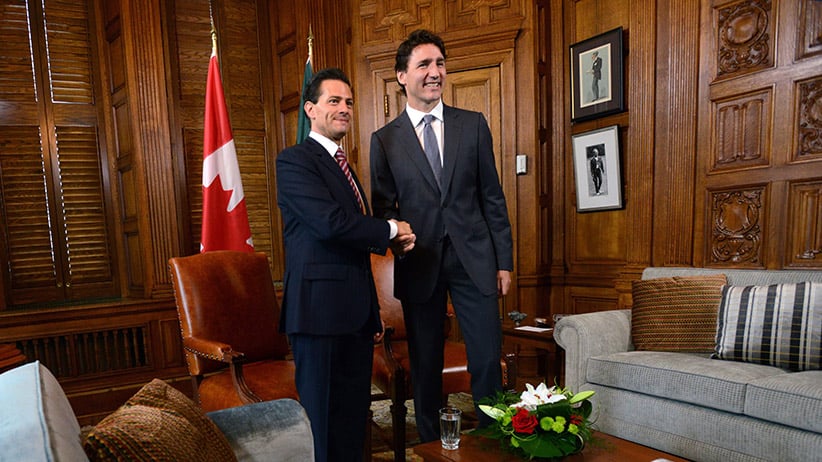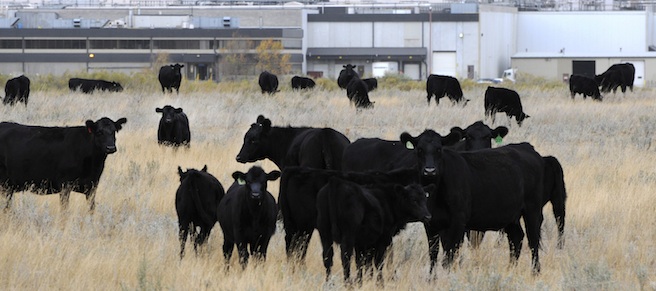Amid Brexit anxieties, Trudeau and Peña Nieto miss the mark
Peña Nieto and Trudeau’s bilateral meetings fail to quite match the moment, writes John Geddes. But then again, Obama’s on his way.
Macleans Magazine’s Ottawa and Montreal bureau head shots at Third Floor York studio in Ottawa December 12, 2013.
Photo by Blair Gable
Share

Canada’s Prime Minister Justin Trudeau and Mexico’s President Enrique Peña Nieto, two of the more glamorous, noticeably non-greying elected leaders on the world stage today, are not used to having trouble holding the gaze of a roomful of cameras.
Yet as the two fit and photogenic leaders stood side by side at podiums in the ornate foyer of the House of Commons today, they must have sensed that they weren’t quite clicking with the assembled media.
Well before Trudeau and Nieto were finished fielding questions, a cluster of Mexican journalists had drifted to the back and were chatting among themselves. Even polite Canadian press gallery members seemed to be checking their smartphones more often than usual, to see if something more pressing was happening elsewhere.
It wasn’t that Trudeau, 44, and Peña Nieto, 49, hadn’t tried. They went for a morning run together to send a message of youthful vigour and provide pictures that didn’t feature them wearing suits and ties. What’s more, they had real stuff to announce—Mexico would drop restrictions on Canadian beef imports and Canada would lift a visa requirement for Mexican visitors.
MORE: John Geddes and Evan Solomon set up the Three Amigos summit
Normally that would have been enough to make this bilateral meeting more worthwhile than most. Not in the week after the Brexit shocker, though; not in the year of Donald Trump. Trudeau clearly sensed the hunger for comments that would connect today’s message on the Canada-Mexico relationship to those deeper sources of global anxiety, but he made only a halfhearted try at feeding it.
“So this relationship, this partnership, this friendship going forward, is an example, I think, to the world that better collaboration, better partnerships are a path to prosperity,” he said. “And that’s a compelling example that we want to showcase at a time where, unfortunately, people are prone to turning inwards, which will, unfortunately, be at the cost of economic growth and their own success in many situations.”
Not exactly a “Because it’s 2015” masterpiece of concise quotability. Trudeau’s drift was in the right direction, but his rhetoric simply wasn’t crisp enough to cut through the welter of comment that’s come in the wake of the British electorate’s inward-turning vote to quit the European Union. As well, there was something merely worthy, rather than obviously compelling, about the two main agreements struck today.
MORE: Is Brexit the start of a new war against globalization?

Firstly, on the trade front, Mexico agreed to lift the last remaining import restrictions on Canadian beef, which stretch back to the 2003 discovery of isolated cases of mad cow disease in Canada. The Canadian Meat Council, while applauding the move, estimated it would add just $10 million a year to Canadian beef sales to Mexico, which have already been topping $130 million. That’s because Mexico has only been blocking imports of beef from animals 30 months old or older, so most Canadian exports from younger cattle were already flowing freely.
Secondly, on the travel issue, Canada agreed to lift a visa requirement on Mexican visitors, starting on Dec. 1. It was imposed a few years ago by the previous Conservative government, in response to a spike in Mexicans applying for refugee status in Canada. But the Canadian government made a point of stressing today that, when the visa is dropped, Mexicans would have to apply for a new permit, called an Electronic Travel Authorization (ETA), before coming to Canada.
Steven Murrens, an immigration lawyer with the Vancouver firm Larlee Rosenberg, said the ETA is already proving an effective barrier against the sort of travellers the much-resented visa sought to discourage. The ETA will be required for travellers to Canada from all visa-exempt nations, except the U.S. That means Mexicans will be in the same category as, say, tourists from Europe and Japan, so they can hardly complain.
The online application for an ETA is much less onerous than applying for a visa. Still, Murrens says early experience suggests the ETA will be effective in weeding out problem travellers. “What we’re seeing, from people who are already starting to apply for it even though it’s not mandatory yet, is they do get refused for previous denials of entry to Canada, criminal issues, and…where people may have had previous issues in the United States,” he said.
In other words, on travel, Canada has found a less onerous system that still provides some additional screening. And, on trade, Mexico has finished a gradual process of phasing out trade restrictions. These are not headline-grabbing breakthroughs. They are the incremental signs of a normal international relationship, where friction is inevitable but doesn’t have to be permanently disruptive.
Come to think of it, maybe that is, as Trudeau claimed, compelling in its own way, and worthy of a showcase. The alternative is downright unsettling. For instance, I asked Jim Laws, executive director of the Canadian Meat Council, to contrast his lobby group’s view of the improved Canada-Mexico relationship with the unsettled situation in Europe.
He seemed taken aback to hear the two files even mentioned together. Canada is supposed to be close to finalizing and ratifying the long-awaited Comprehensive Economic and Trade Agreement with the EU, and Trade Minister Chrystia Freeland has said the Brexit vote doesn’t put that in jeopardy. But Laws wasn’t taking for granted anything from the other side of the Atlantic. “This going to be an interesting situation,” he said. “We don’t know whether [CETA] will be stalled or whether Europe will continue to ratify it. We don’t know yet what is going to happen.”
That sense of anything being possible, especially bad things, is the backdrop for tomorrow’s North American leaders’ summit in Ottawa, when Trudeau and Peña Nieto will be joined by U.S. President Barack Obama. Like today, there will be worthwhile progress to announce. And, like today, the real challenge will be making a story of sensible North American initiatives audible in the din of Brexit and Trump. Trudeau and Peña Nieto didn’t manage it. Perhaps Obama, the grizzled veteran of this trio at just 54, and no slouch at finding words to match a moment, can make it matter.